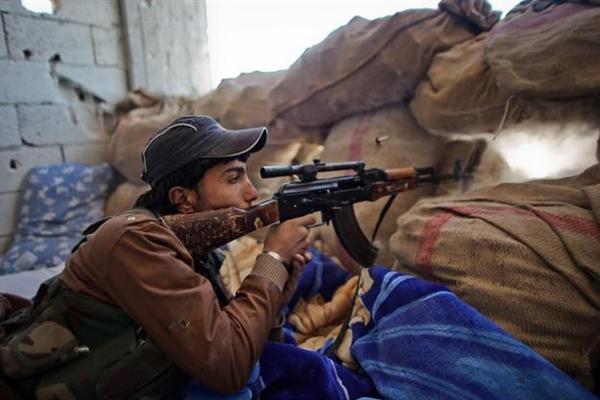Kobane incidents a plot targeting Turkish gov’t: PM
Sedat Ergin - MANILA/ANKARA


A file picture taken on November 7, 2014, shows a fighter of the Syrian Kurdish People's Protection Units (YPG) holds a position behind sandbags during fighting against ISIL militants in the Syrian besieged border town of Ain al-Arab, known as Kobane by the Kurds). AFP PHOTO / AHMED DEEB
A number of plots have been hatched against the Turkish government over its position on the Syrian conflict, Prime Minister Ahmet Davutoğlu has said.Claims of links between Turkey and the Islamic State in Iraq and the Levant (ISIL), as well as Ankara’s supposed “inaction” over the humanitarian tragedy in the Syrian border town of Kobane, were not motivated by good will, Davutoğlu told reporters on board a plane returning from the Philippines’ capital Manila on Nov. 18.
“Although Turkey has repeatedly stated that it has no relationship with ISIL, and despite there being not a single piece of evidence showing that any ISIL leader has crossed from Turkey, the international media has been reporting for months as if Turkey is lending support to ISIL. Some circles standing behind these [claims], ‘parallel’ elements inside Turkey, and parties that support the regime in Syria, have all found an opportunity to hit the government and defame Turkey,” Davutoğlu said.
The term “parallel elements” was an apparent reference to followers of the movement of U.S.-based Islamic scholar Fethullah Gülen, referred to by government officials as a “parallel structure” within the state. The “parallel structure” was publicly documented as one of the leading threats in the National Security Council’s (MGK) Oct. 30 meeting, which brings together the country’s top civilian and military leaders.
“Within this framework, they provoked the Oct. 6-7 incidents over Kobane. When the international media, which was silent while hundreds of thousands of people were being bombed in Aleppo, started making broadcasts about people being killed in Kobane, this also cannot be explained with good intentions. There is a plot here,” Davutoğlu said.
Street unrest that peaked on Oct. 6 and 7 led to the deaths of dozens of people in clashes between rival groups, amid protests over the government’s perceived inaction toward Syrian Kurds besieged by jihadists in Kobane.
Davutoğlu said the “parallel structure” had launched a psychological operation against the ruling Justice and Development Party (AKP) government. “There are circles who want the conflict in Syria to spread into Turkey,” he said. When asked to elaborate on those “circles,” he responded that they were those who are “annoyed at the development Turkey has made in the last 12 years [under the AKP].”
“Both the ‘truck incident’ and the Kobane incidents were aimed at tainting Turkey’s image. These cannot be a coincidence,” Davutoğlu said, referring to a prosecutor’s initiative to stop and investigate trucks heading to the Syria border on Jan. 19, citing possible arms transporting. The government slammed the prosecutors and soldiers involved in the operation, arguing that both the truck and the personnel were protected by the National Security Organization’s (MİT) legal immunity.
The government also cited the incident as an example on how members of the “parallel structure” had infiltrated the judiciary and security forces, blaming the Gülen movement.
